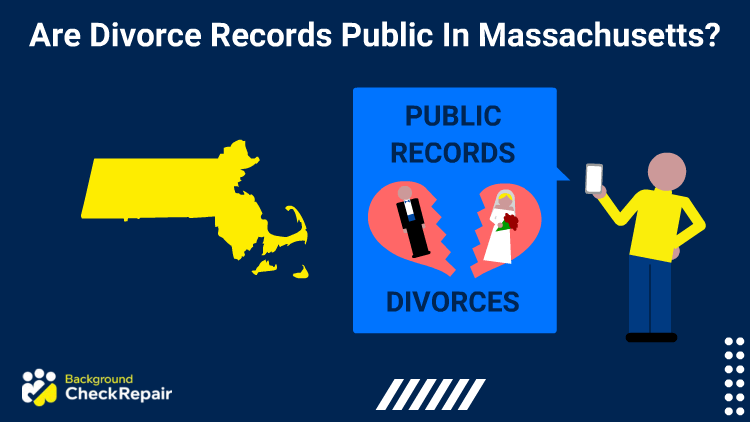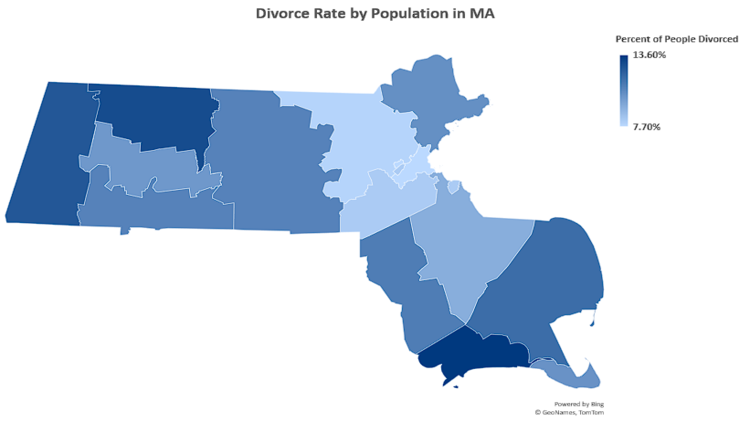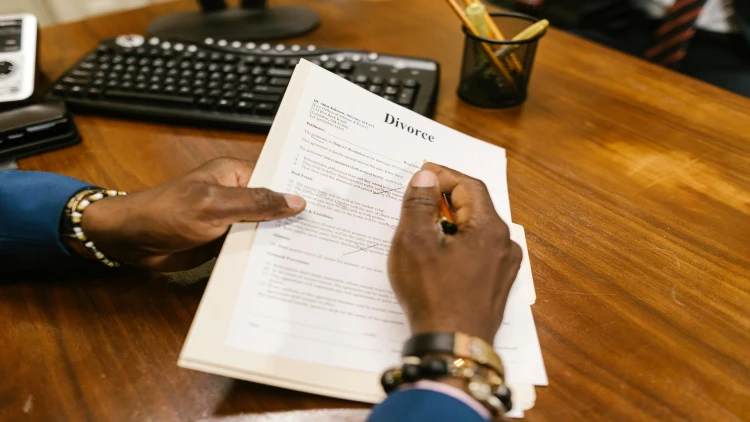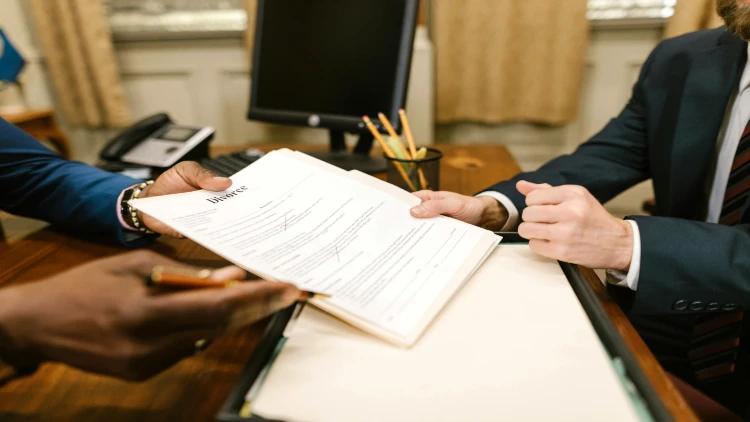
Are divorce records public in Massachusetts?
Many people seeking comprehensive, quality information about the divorce process in this New England state and if they are able to do a free divorce check will be happy to know that yes, Massachusetts divorce records are public.
One of the reasons for this is that Massachusetts is a “no fault” divorce state, and that means that spouses can file for divorce for any reason, even without the other person’s knowledge.
Fortunately, anyone can do a free Massachusetts divorce search instantly, using online tools and find out for sure, are divorce records public in Massachusetts.
For others who want to obtain copies of divorce records, the process is a little more involved. This complete guide covered all the info anyone needs to search for and obtain divorce records in Massachusetts.
What To Know About Divorce in Massachusetts
Although states across the United States have seen an overall decline in divorce rate in recent years, the word still looms over married couples, with 2020 data from the Centers for Disease Control and Prevention indicating that nearly half of all marriages in the nation still end in divorce (~45%).20
Marriage and divorce laws vary from state to state (see Massachusetts marriage law Mass General Laws c.207 and divorce law Mass. General Laws c.208, and subsequently, there is quite a bit of variance in the way that divorce cases are handled.21,22
Here’s what every married MA resident needs to know about divorce in Massachusetts.
Firstly, Massachusetts is a no-fault divorce state. This means that any marriage can be terminated without the necessity to prove the other party was at fault. The petitioner must indicate that there was an “irretrievable breakdown” in the marriage.
Secondly, to be eligible for divorce filing, an individual must have been a resident of Massachusetts for one year or in a fault divorce case, must be able to prove that the reason for the divorce occurred in the state of Massachusetts and that the couple resided there together.2
Thirdly, the divorce process can be lengthy and costly, particularly in contested cases. Read on for more information about the types of divorce in MA.
Finally, there is a $200 fee to file for divorce in the state of Massachusetts.9
Types of Divorce in Massachusetts
Divorces are categorized based on whether the case is contested or uncontested and whether the complaint is filed as “fault” or “no-fault”. In an uncontested case, both parties agree that a divorce is desirable and have reached an agreement on how assets will be divided. This is a no-fault divorce case.

(Image: RDNE Stock project36)
In contested cases, the parties disagree on some aspect of the case, either the need for divorce or the terms of the divorce.
In a no-fault divorce case, no party is attempting to assign blame for the marital issues, but it is believed that the marriage is not salvageable.
A fault divorce, in contrast, seeks to prove that one spouse was the cause of the marital breakdown.8
Look at how these categories are organized into three types of divorce in the state of Massachusetts.
No-Fault 1A Divorce (Uncontested Divorce Massachusetts)
The first type of divorce is the no-fault 1A divorce. This is an uncontested divorce case where both spouses agree that the marriage is past saving and an agreement between the two parties has been reached about how marital assets will be divided and child custody will be arranged.
No-Fault 1B Divorce (Contested No-Fault Divorce Massachusetts)
The second type of divorce in Massachusetts is a no-fault 1B divorce. This type of divorce case is still categorized as no-fault.
It is, however, a contested case because the two parties disagree about the divorce. The disagreement may be over the matter of the divorce itself or about how financial assets and obligations will be divided.
Note that couples who reach an agreement may apply to have a 1B divorce changed to a 1A.
Fault Divorce (Are Divorce Records Public in Massachusetts When There’s Fault?)
The third and final divorce type in MA is a fault divorce. In this scenario, one party attempts to prove that the other party is the cause of the marital breakdown.
A fault divorce may take longer to execute and finalize, and the proceedings can sometimes be more costly.
Per Massachusetts divorce law (M.G.L. c. 208, s. 1, acceptable grounds for a fault divorce include:8,23
- Impotency
- Desertion of 1 year
- Gross habits of intoxication
- Adultery
- Non-provision of support
- Abuse
- Prison sentence of 5 years or more
How To Find Out If Someone Filed for Divorce in Massachusetts
In most cases, either spouse would be aware if the other filed for divorce because a divorce summons would be delivered to the non-filer. However, in some instances, it is possible for one party to obtain a divorce without the other’s knowledge, particularly if they are able to prove that they could not locate or contact an estranged spouse. Thus, it is possible, in theory, for one spouse to file for a divorce and the other spouse not know about it.
So how can someone find out if their spouse has filed for divorce? When asking the spouse directly is out of the question, a concerned individual has a few other resources to consider.
Sometimes, an internet search using the spouse’s full name and “divorce” may generate useful results.
However, a more likely way of finding the desired information is by contacting the county clerk or visiting the courthouse in the county where a divorce is most likely to have been filed. If a complaint has been filed, a county clerk should have these documents available. Note that fees may apply.16
Massachusetts Divorce Timeline
The timeline for a divorce in Massachusetts depends entirely upon the type of divorce complaint that is filed, and a divorce isn’t over once the paperwork is submitted. The total time for a divorce to be finalized can be between six months and two years (in more complicated cases), with an average of about one year.11
Timeline for a No-Fault 1A Divorce
Because a no-fault 1A divorce is an uncontested case, it tends to advance more smoothly and quickly than a contested case. The written separation agreement is drafted and signed prior to paperwork filing, less mediation/attorney time and input is required, and the judge’s responsibilities are to ensure that information is accurate and complete rather than to rule on the justness of asset distribution, etc. The table below looks at a timeline breakdown for no-fault 1A divorces.6,12
| Point in Divorce Process | Average Time to Completion |
| Paperwork Filing | This is the initial step or starting point. |
| Divorce Hearing | Can be scheduled immediately. May take around one month for a court date, depending upon court availability. Hearing will probably take one day. |
| Nisi Period | Following the judge’s decision to dissolve the marriage, there is a 30-day waiting period before the nisi decree is issued. There is an additional 90-day waiting period for the nisi decree to become final. |
| Total Time For Divorce Proceedings | Around 6 months, give or take. |
Timeline for a No-Fault 1B Divorce or Fault Divorce
Contested divorce cases usually take significantly longer than uncontested cases because of negotiations, discovery time, and potential trials. The table below provides some insight into the timeline for contested divorce cases.11
| Point in Divorce Process | Average Time to Completion |
| Paperwork Filing | Divorce proceedings begin when the petitioner submits the initial paperwork and fees. |
| Service of Divorce Summons | Petitioner has 90 days to serve papers to the spouse. |
| Response to Summons | Respondent has 20 days to file a response in court. |
| Exchange of Financial Statements/Separation Agreement | Time to completion is variable. The parties may require mediation or attorney assistance to complete this step. |
| Discovery | The length of discovery is variable and depends upon the extent of the issues which need to be resolved. |
| Pre-trial Hearing | Some cases may have a pre-trial when there are unresolved issues. |
| Divorce Hearing | Must be scheduled at least 6 months after the initial filing date. |
| Nisi Period | Following the judge’s decision to dissolve the marriage, a divorce decree nisi is immediately issued. The couple must wait 90 days for the nisi decree to become final. |
| Total Time For Divorce Proceedings | Typically 12 to 18 months. |
What Does a Divorce Decree Look Like in Massachusetts?
Once a judge has determined that a marriage has experienced an “irretrievable breakdown,” the judge will enter an order for the divorce. In no-fault 1A cases, a judgment nisi (also called divorce nisi or decree nisi) is automatically entered after 30 days.
In no-fault 1B cases and fault divorces, the judgment is entered immediately. Ninety days later, the decree nisi will become absolute. A divorce decree is a legally binding document.1,3
Divorce decrees vary in length depending on the type of divorce filed: uncontested divorce decrees may only be a single-page document, while contested divorce decrees may include all the forms, trial information, and judge’s rulings.1 The divorce decree will list the date and place of the divorce ruling.
It should include the name of the presiding judge as well as the full names of both parties.
Decrees typically outline the division of responsibilities and assets for each party following divorce.19
Decrees for Divorce Absolute vs. Divorce Nisi
There are two types of divorce decree in the state of Massachusetts: the divorce decree nisi and the divorce decree absolute. A divorce nisi decree means that the judge has granted the divorce, and the couple is in a sort of limbo waiting stage for the divorce to finalize. The idea behind the decree nisi is to give the involved parties time to re-evaluate if necessary or ascertain that the details of the divorce agreement are complete and accurate.
After a specified period of time, the divorce automatically becomes final and the divorce decree becomes absolute. In Massachusetts, the nisi waiting period is 120 days for 1A divorces and 90 days for 1B and fault divorces.3
Are Massachusetts Divorce Records Public? (Public Divorce Records Massachusetts)
For anyone who has ever questioned “how to know when my divorce is final,” “how to locate free divorce date info?,” or “Are divorce records public in Massachusetts?,” knowing how to access divorce records is key. In general, divorce proceedings are a matter of public record and should be accessible to anyone who knows where to look. There are some instances when divorce information may be sealed, such as to protect the privacy of a minor, but in most situations, these are available public records.

(Image: RDNE Stock project37)
Unfortunately, there is not one universal way to access these records. Divorce cases are handled at the state level, and therefore there is not a nationwide database for divorce records. When searching for divorce records, an individual must look to the state and county in which the divorce occurred.19
Mass.Gov Divorce Records
The official Mass.gov website is an excellent resource for individuals exploring the ins and outs of the divorce process.32 This website provides guidelines on how to request a certified copy of a divorce record by mail or in person. Note that there are fees to obtain certified copies.4
If an individual wants to access their divorce records but does not require a certified copy, there are some online options available. Mass.gov uses a Trial Court Electronic Case Access database where individuals can do case searches for free, and the Secretary of the Commonwealth of Massachusetts also has an online Public Records Request Database where some records may be found.14, 17, 32
To access divorce records, the requestor must have the docket number of the divorce case.
If this information is unknown, the individual can contact the county Probate and Family Court (Commonwealth of Massachusetts, 2022, Probate and Family Court Locations) to obtain it.33
County Divorce Records
In the state of Massachusetts, divorce cases are handled by the specific county’s Probate and Family Court. The Probate and Family Court also maintains copies of divorce records for each case in the county.
Use the following table to access the websites for the Probate and Family Court in each county of Massachusetts.
| Are Divorce Records Public in Each Massachusetts County? | Massachusetts County Divorce Records |
| Are Divorce Records Public in Barnstable County, Massachusetts? (Barnstable County Divorce Records) | Barnstable Probate and Family Court |
| Are Divorce Records Public in Berkshire County, Massachusetts? (Berkshire County Divorce Records) | Berkshire Probate and Family Court |
| Are Divorce Records Public in Bristol County, Massachusetts? (Bristol County Divorce Records) | Bristol Probate and Family Court |
| Are Divorce Records Public in Dukes County, Massachusetts? (Dukes County Divorce Records) | Dukes Probate and Family Court |
| Are Divorce Records Public in Essex County, Massachusetts? (Essex County Divorce Records) | Essex Probate and Family Court |
| Are Divorce Records Public in Franklin County, Massachusetts? (Franklin County Divorce Records) | Franklin Probate and Family Court |
| Are Divorce Records Public in Hampden County, Massachusetts? (Hampden County Divorce Records) | Hampden Probate and Family Court |
| Are Divorce Records Public in Hampshire County, Massachusetts? (Hampshire County Divorce Records) | Hampshire Probate and Family Court |
| Are Divorce Records Public in Middlesex County, Massachusetts? (Middlesex County Divorce Records) | Middlesex Probate and Family Court South – Woburn
Middlesex Probate and Family Court North – Lowell |
| Are Divorce Records Public in Nantucket County, Massachusetts? (Nantucket County Divorce Records) | Nantucket Probate and Family Court |
| Are Divorce Records Public in Norfolk County, Massachusetts? (Norfolk County Divorce Records) | Norfolk Probate and Family Court |
| Are Divorce Records Public in Plymouth County, Massachusetts? (Plymouth County Divorce Records) | Plymouth Probate and Family Court |
| Are Divorce Records Public in Suffolk County, Massachusetts? (Suffolk County Divorce Records) | Suffolk Probate and Family Court |
| Are Divorce Records Public in Worcester County, Massachusetts? (Worcester County Divorce Records) | Worcester Probate and Family Court |
Massachusetts Counties Records Search
Now that the question of “Are divorce records public in Massachusetts?” has been addressed, interested parties may find themselves wondering about what other public records are available to them. Individuals can find additional public record information and resources listed by county in the following tables.
Note that the district court of Massachusetts is located in 62 courts across the Commonwealth. Most counties are served by multiple district courts. Scroll to the bottom of the district court page to see which cities are served by that court.
For additional information about criminal records searches, read Background Check: Massachusetts (MA) State Database Search Guide (CORI).
Massachusetts Cities Records Search
Many Massachusetts residents live in one of the following most-populated cities: Boston, Worcester, Springfield, Cambridge, Lowell, Brockton, New Bedford, and Quincy. The following direct readers to the relevant city or county resources for each of these cities.
Current Divorce Statistics in Massachusetts
The last decade has witnessed more couples in the U.S. seeking engagement background checks and marital union background investigation before marriage, waiting longer to get married, and avoiding traditional marriage altogether. Subsequently, the United States has seen a decline in the divorce rate as well.

(Image: Alex Green38)
Before diving into the question of “Are divorce records public in Massachusetts?” take a look at some recent divorce statistics for the state.
The New England area of the U.S. has some of the lowest rates of divorce, nationally. Massachusetts is no exception with a divorce rate of 6.4%.13 This “crude” divorce rate denotes the number of divorced women out of every 1,000 married individuals.12
Another statistic commonly used is the percentage of the population that is currently divorced. According to the United States Census Bureau’s 2020 data, approximately 9.4% of Massachusetts residents were divorced at the time of data collection.35
Some estimates which include divorces and legal separations place Massachusetts at an approximate rate of 11%.18
Scan the tables below to see the percentage of divorced people per Massachusetts county and major city.
| Divorce Rate By Massachusetts County | % Divorced* | % Divorced/Separated18 |
| Divorce Rate in Barnstable County, MA | 11.7% | ~13% |
| Divorce Rate in Berkshire County, MA | 12.5% | ~15% |
| Divorce Rate in Bristol County, MA | 11.1% | ~13% |
| Divorce Rate in Dukes County, MA | 13.6% | ~13% |
| Divorce Rate in Essex County, MA | 10.4% | ~12% |
| Divorce Rate in Franklin County, MA | 12.9% | ~15% |
| Divorce Rate in Hampden County, MA | 10.9% | ~13% |
| Divorce Rate in Hampshire County, MA | 10.1% | ~12% |
| Divorce Rate in Middlesex County, MA | 7.9% | ~10% |
| Divorce Rate in Nantucket County, MA | 10.3% | ~13% |
| Divorce Rate in Norfolk County, MA | 8.2% | ~10% |
| Divorce Rate in Plymouth County, MA | 9.3% | ~12% |
| Divorce Rate in Suffolk County, MA | 7.7% | ~11% |
| Divorce Rate in Worcester County, MA | 10.9% | ~13% |
* Estimates from 2020 census data.
The following table looks at the divorce rate for the eight most populous cities in the state of Massachusetts.
| Divorce Rate By Massachusetts City | % Divorced* | % Divorced/Separated18 |
| Divorce Rate in Boston | 7.3% | ~10% |
| Divorce Rate in Worcester | 11.7% | ~14% |
| Divorce Rate in Springfield | 10.8% | ~15% |
| Divorce Rate in Cambridge | 6.3% | ~8% |
| Divorce Rate in Lowell | 10.5% | ~13% |
| Divorce Rate in Brockton | 10.1% | ~15% |
| Divorce Rate in New Bedford | 11.7% | ~15% |
| Divorce Rate in Quincy | 8.7% | ~10% |
* Estimates from 2020 census data.
What to Do When Filing for Divorce in Massachusetts
The process required for divorce filing depends to large extent upon the type of divorce complaint the petitioner is filing. Likewise, there are some forms which are specific to divorce type. Explore the steps below to file for divorce in Massachusetts.

(Image: RDNE Stock project39)
Step 1: Ensure eligibility for divorce in Massachusetts. (e.g. 1 year residence, residence in state as a couple, etc.).
Step 2: Respectfully discuss the intention to divorce with the spouse. A spouse caught unawares by divorce papers is less likely to be cooperative.
If the spouse supports the decision to divorce, proceed to Step 3.
If the spouse does not support the decision to divorce, proceed to Step 3b under “Filing a 1B Divorce.”
Filing a 1A Divorce
Step 3a: In a separate conversation, discuss the terms of the divorce (property division, child custody, etc.) and create a separation agreement that outlines the terms. The written contract must be signed by both parties and a notary. Note that some couples may choose to use an attorney or mediator to help reach an agreement.
Step 4a: Complete the necessary forms to proceed with a “no-fault 1A divorce.” The necessary forms are linked below.
Note: Additional forms apply for couples with children and in some special circumstances. See Divorce Probate and Family Court Forms.34
Step 5a: File the completed forms in person with the county Probate and Family Court or online with the court’s eFiling system.10 Pay the $200 filing fee and $15 filing surcharge.6
The court schedules a hearing date after all forms have been filed and fees have been paid.
Filing a 1B Divorce
Step 3b: Complete the necessary forms to proceed with a “no-fault 1B divorce.” The necessary forms are linked below.
- Certified copy of the marriage certificate (Obtainable from the Registry of Vital Records)24
- Complaint For Divorce Under Section 1B (CJD-101B)27
- A financial statement from each spouse (In a contested case, the petitioner may submit a “Request For a Financial Statement.” The respondent has 10 days to provide the statement to the court.)28
Note: Additional forms apply for couples with children and in some special circumstances. See Mass.gov.7
Step 4b: File the completed forms in person with the county Probate and Family Court or online with the court’s eFiling system.10 Pay the $200 filing fee, $15 filing surcharge, and a $5 divorce summons charge.
Step 5b: After filing the necessary paperwork, the divorce complaint and summons must be served to the spouse (respondent). See Mass.gov’s guide on “Service of Process of Domestic Relations Complaints“.29 At this point, the divorce has been officially filed and divorce proceedings are in motion.7
After the spouse responds (or doesn’t respond) to the divorce summons, the divorce proceeds to a pre-trial or trial hearing.
Filing a Fault Divorce
In the case of a fault divorce, the relationship between spouses is less likely to be civil and the divorce is not collaborative. The steps for filing this type of divorce look a bit different.
Step 1: Ensure eligibility for divorce in Massachusetts. (e.g. 1 year residence, residence in state as a couple, etc.). Furthermore, ensure that there are provable grounds for a fault divorce (see M.G.L. c. 208, s.1).23
Step 2: Complete the necessary forms to proceed with a “fault divorce.” The necessary forms are linked below. Notice that the Complaint for Divorce Form for a fault divorce is different from the form required for a no-fault 1B divorce.
- Certified copy of the marriage certificate (Obtainable from the Registry of Vital Records)24
- Complaint for Divorce Form CJD-101 (signed by petitioner)31
- Record of Absolute Divorce (R-408)27
- Note: Additional forms apply for couples with children and in some special circumstances. See Mass.gov5
Step 3: File the completed forms in person with the county Probate and Family Court or online with the court’s eFiling system.10 Pay the $200 filing fee, $15 filing surcharge, and a $5 divorce summons charge.
Step 4: After filing the necessary paperwork, the divorce complaint and summons must be served to the spouse (respondent). See Mass.gov’s guide on “Service of Process of Domestic Relations Complaints”.29 At this point, the divorce has been officially filed and divorce proceedings are in motion.5
After the spouse responds (or doesn’t respond) to the divorce summons, the divorce proceeds to a pre-trial or divorce trial hearing.
In the state of Massachusetts, divorce cases are handled in the Probate and Family Court system of each county. The Mass.gov website maintains all of the required forms for divorce proceedings.
Individuals can download the desired forms directly from the website using the link above.34
What Is the Difference Between Massachusetts Marriage Records and Massachusetts Marriage License Records?
Anyone who has ever wondered about the difference between marriage records and marriage license records is in good company. The small distinctions in terminology can be confusing for individuals who need to acquire specific marriage records for official or personal reasons.
In Massachusetts, there are two types of marriage records: the marriage license and the marriage certificate. A marriage license is issued to individuals intending to marry. The license grants the authority for the individuals to be married.
In contrast, a marriage certificate can be issued after a couple is married. It certifies that the individuals are legally married and the marriage is valid.19
As anyone who has been through a divorce knows, divorce proceedings can be intense, complicated, and drawn out. Individuals may endure further stress attempting to track down divorce records after the fact. This article addressed the question of “Are divorce records public in Massachusetts?” and provided all the necessary resources for anyone to obtain their divorce records.
Frequently Asked Questions About Are Divorce Records Public in Massachusetts







